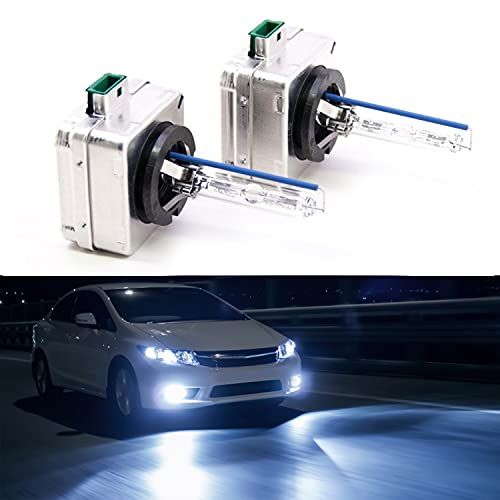HID headlights are legal if they meet specific regulations and guidelines. In the US, the Department of Transportation (DOT) ensures compliance.
When it comes to automotive lighting, the legality of High-Intensity Discharge (HID) headlights is a common concern. HID headlights are popular due to their bright and efficient illumination. However, there are regulations and guidelines that dictate their use on the road.
In the United States, the Department of Transportation (DOT) oversees the legality of automotive lighting, including HID headlights. It is essential to understand these regulations to ensure compliance and avoid potential legal issues. Let’s explore the legal aspects of HID headlights and the requirements that need to be met for them to be considered legal for road use.

Credit: www.pnwriders.com
The Legality Of Hid Headlights
HID headlights are legal if they meet specific regulations. It is important to note that HID bulbs should only replace original HID bulbs in vehicles. Using HID conversion kits on vehicles with halogen bulbs may be illegal. Make sure to comply with laws regarding headlight upgrades.
| Variations in Law by Region |
| In the United States, the Department of Transportation (DOT) sets the rules and guidelines for headlight legality. In Canada, it is Transport Canada that regulates it. The only legal HID lights are those that come factory-fitted by the manufacturer or those that are professionally installed and include a self-leveling function. However, in most places, HID conversion kits are illegal and will cause a vehicle to fail inspection. It is important to note that any aftermarket headlight upgrade should comply with federal regulations and compliance to avoid legal issues. |
| Federal Regulations and Compliance |
| The US and Canada have strict federal regulations and compliance requirements for all types of headlights. LED and HID headlights are legal if they follow the specified rules and guidelines. It is crucial to ensure that any aftermarket headlight upgrade complies with the federal regulations and is not a safety hazard to other drivers on the road. Failure to comply with the regulations and compliance requirements can result in legal issues and potential fines. |

Credit: www.caranddriver.com
Understanding Hid Technology
When it comes to understanding HID technology, it’s important to know the components and functions. HID headlights, also known as High-Intensity Discharge headlights, use an electric arc to create a bright light. The main components include the bulb, ballast, and igniter. The bulb contains xenon gas and metal salts, which produce the light when the arc is formed. The ballast regulates the electrical current to the bulb, while the igniter provides the initial high voltage to start the arc.
Comparing HID headlights to halogen and LED, HID lights offer a brighter and more focused beam, providing better visibility on the road. They also have a longer lifespan compared to halogen bulbs. However, it’s important to note that HID headlights must meet certain regulations to be considered legal. It’s crucial to ensure that the HID bulbs are installed in vehicles that originally had HID bulbs and follow the guidelines set by the Department of Transportation (DOT) or Transport Canada.
Factory-installed Vs. Aftermarket Hid Kits
It’s important to know the legality of HID headlights, whether factory-installed or aftermarket kits. In the US, the Department of Transportation sets the rules and guidelines for safe and legal headlights. It’s crucial to follow these regulations to avoid penalties and ensure road safety.
| OEM Specifications |
|---|
| Are HID headlights DOT approved? |
| Are HID bulbs road legal? |
| Are HID headlight conversion kits legal? |
| Are HID xenon lights legal? |
When it comes to HID headlights, it is important to understand the difference between factory-installed and aftermarket HID kits. Factory-installed HID headlights are those that are installed by the vehicle’s manufacturer and are designed to meet all the necessary legal specifications. These headlights are generally considered legal as long as they comply with the regulations set by the Department of Transportation (DOT) in the United States or Transport Canada in Canada.
On the other hand, aftermarket HID kits refer to HID headlights that are installed by the vehicle owner or a third-party provider after the purchase of the vehicle. These kits may not always meet the OEM specifications and can pose certain risks. It is crucial to ensure that any aftermarket HID kit you choose complies with the necessary regulations to avoid potential legal issues.
It is important to note that the legality of HID headlights can vary depending on the country or state you reside in. Always check the specific regulations and guidelines set by the appropriate authorities to ensure compliance and safety.
Dot Approval For Hid Headlights
|
Are HID headlights legal? Criteria For Roadworthiness
Impact On Insurance And MotHID conversion kits can have implications on insurance and MOT tests. The Driver and Vehicle Standards Agency (DVSA) confirms that an HID conversion kit would make a car fail the UK IVA test, rendering it non-roadworthy. Therefore, it is important to ensure compliance with legal requirements and seek professional installation if considering HID headlights. |
Safety Concerns With Hid Lights
HID headlights raise safety concerns due to their legality. It is important to note that HID bulbs should only be installed in vehicles that originally had HID bulbs, as installing them in vehicles with halogen bulbs is not road legal.
LED and HID headlights can be legal if they meet certain rules and guidelines set by the Department of Transportation (DOT) in the US.
| Safety Concerns with HID Lights |
| HID lights have been a popular choice among car enthusiasts due to their brighter and more focused beam. However, these lights can also pose safety concerns, especially when it comes to glare and visibility issues. The intense light emitted by HID headlights can blind other drivers on the road, causing accidents. Additionally, HID lights require self-leveling and cleaning to maintain their effectiveness. Self-leveling ensures that the lights are always pointed at the road, while cleaning removes dirt and debris that can obstruct the light. It is important to ensure that HID lights comply with the regulations set by the Department of Transportation (DOT) or Transport Canada to ensure they are legal and safe to use on the road. |
Legal Repercussions Of Non-compliant Hids
| Non-Compliant HIDs | Legal Repercussions |
| Law Enforcement and Penalties | Vehicle Approval Failures |
Upgraded headlight lights must adhere to specific regulations to remain road legal. Installing HID bulbs in a vehicle not designed for them violates laws. Law enforcement can penalize drivers for non-compliant lights, potentially causing approval failures. These regulations ensure safety and compliance with transport standards. It’s crucial to follow guidelines for proper installation to avoid legal issues.
Myths And Misconceptions
Legal vs. Illegal Aspects
When it comes to HID headlights, it is essential to understand the legal implications. HID bulbs must meet specific regulations to be considered road legal. The Department of Transportation in the US and Transport Canada oversee compliance. HID bulbs should only replace original HID bulbs, as installing them in a halogen bulb vehicle is not permitted. Factory-fitted HID lights or professionally installed ones with self-levelling features are lawful. Aftermarket HID conversion kits pose risks, failing safety tests and rendering vehicles non-roadworthy. Stay informed to ensure your vehicle’s lighting meets regulatory standards.
Staying Legal With Hid Headlights
| Are HID Headlights Legal |
| Staying Legal with HID Headlights |
| Best Practices for Compliance |
Using HID headlights must comply with regulations and standards to ensure road legality. It’s crucial to select the appropriate kit for your vehicle to avoid legal issues. DOT approval is essential for LED and HID headlights to be considered legal. Installation of HID conversion kits not meeting standards can lead to MoT failures. Only factory-fitted or professionally installed HID lights with required features are considered legal. Always verify regulations and approval for HID lighting to stay compliant and avoid penalties.

Credit: www.youtube.com
Frequently Asked Questions
Are Hid Bulbs Road Legal?
Yes, HID bulbs are road legal as long as they meet the specifications in the legislation. However, they should only be fitted in a vehicle that originally had HID bulbs. If your car originally had halogen bulbs, it is not legal to install HID bulbs.
LED and HID headlights are legal if they follow certain rules and guidelines set by the Department of Transportation (DOT) in the US and Transport Canada in Canada. HID conversion kits can cause a car to fail the UK Individual Vehicle Approval (IVA) test, making it non-roadworthy.
It is important to ensure that HID lights are factory-fitted or professionally installed with a self-leveling function.
Are Hid Headlights Dot Approved?
Yes, HID headlights can be DOT approved if they meet certain rules and guidelines. The Department of Transportation (DOT) in the US ensures that cars are safe and follow regulations. In Canada, Transport Canada performs a similar role. However, it is important to note that HID bulbs should only be fitted in vehicles that originally had HID bulbs.
If a car originally had halogen bulbs, it is not road legal to install HID bulbs.
Are Hid Headlight Conversion Kits Legal?
It depends on the specifications and rules that the HID conversion kit follows. In the US, the Department of Transportation (DOT) ensures that cars meet safety standards. In the UK, an HID conversion kit would cause a car to fail the Individual Vehicle Approval (IVA) test, making it non-roadworthy.
It is important to follow guidelines and regulations to ensure legality and safety.
Are Hid Xenon Lights Legal?
Yes, HID xenon lights are legal only if they are factory-fitted by the vehicle’s manufacturer or professionally installed with self-leveling function. Aftermarket HID conversion kits may not meet legal requirements. It’s important to comply with regulations when installing HID lights.
Are Hid Headlights Legal For Use On Public Roads?
Yes, HID headlights are legal if they meet specific regulations and guidelines set by the Department of Transportation (DOT) in the US and Transport Canada.
What Are The Potential Risks Of Using Illegal Hid Conversion Kits?
Illegal HID conversion kits can lead to failed vehicle inspections, insurance implications, and non-roadworthy status as confirmed by the Driver and Vehicle Standards Agency (DVSA).
Can I Install Hid Bulbs In A Vehicle That Originally Had Halogen Bulbs?
It is not road legal to install HID bulbs in a vehicle that was originally equipped with halogen bulbs, as per the regulations.
Conclusion
The legality of HID headlights varies by country and must comply with specific regulations. It’s crucial to verify the rules in your region before installing HID bulbs. Non-compliance can lead to legal repercussions and safety concerns. Understanding the guidelines is essential for responsible vehicle lighting modifications.


Leave a Reply